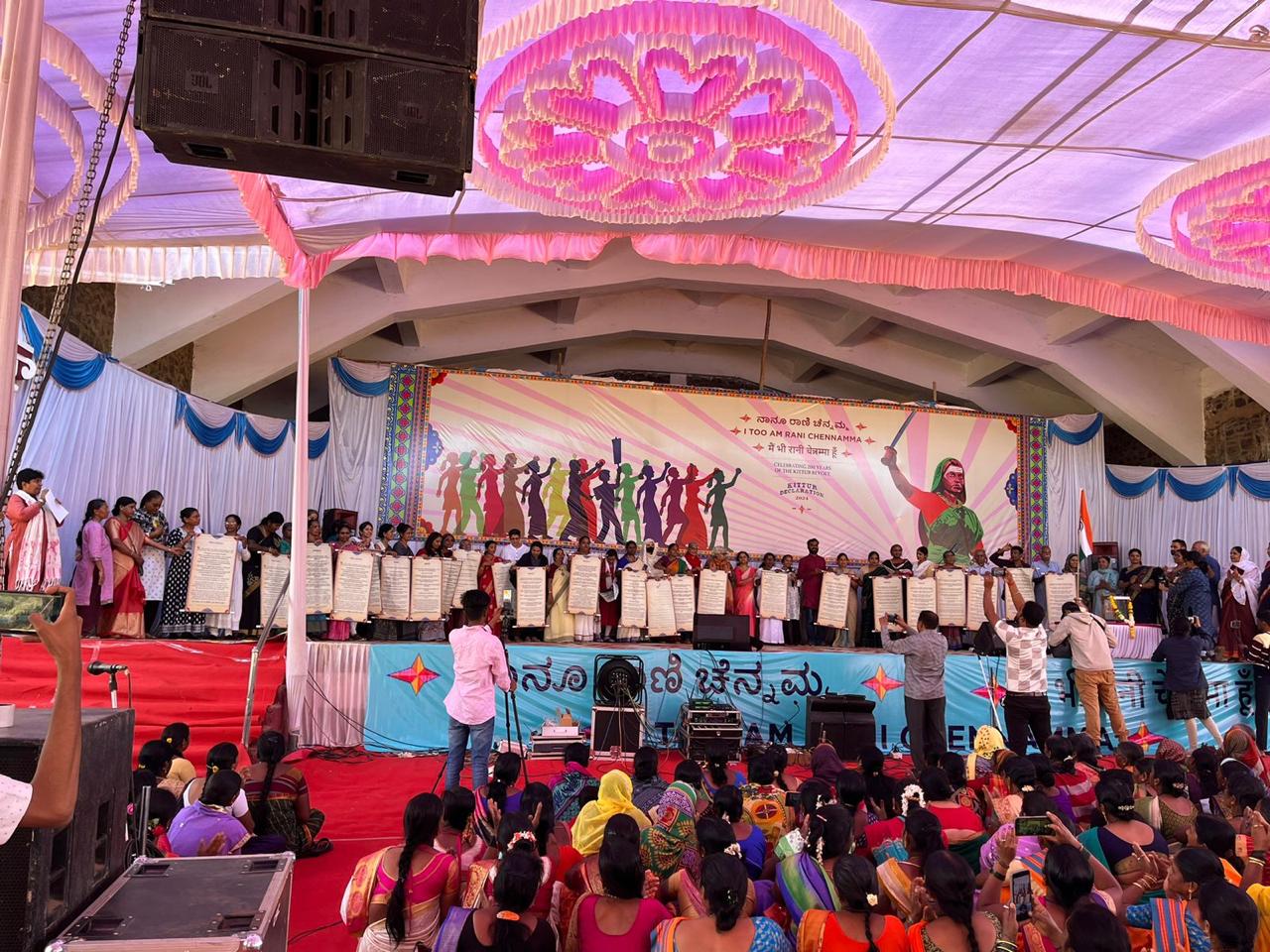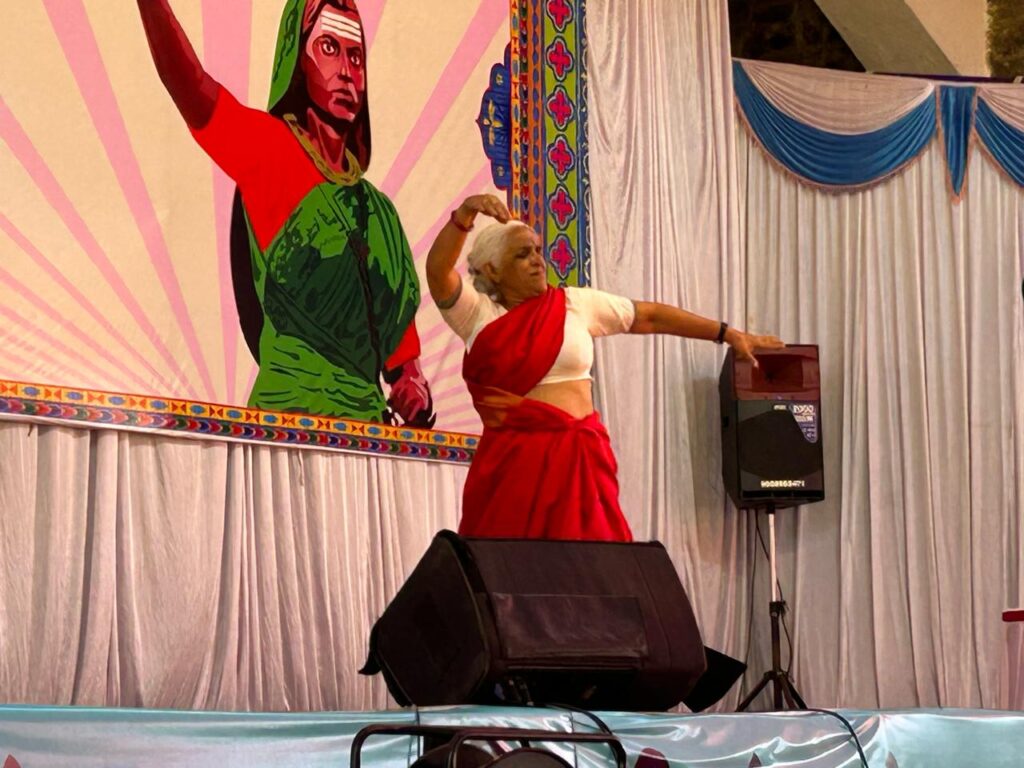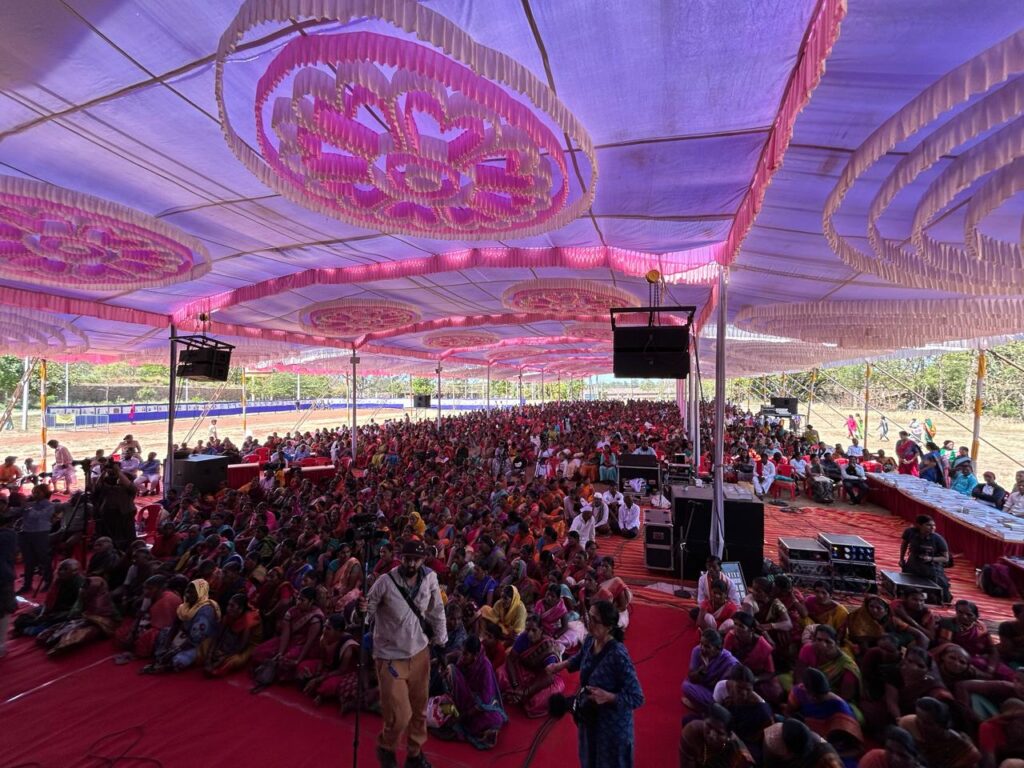A campaign effort for several months, the Kittur Declaration passed in Kittur on Wednesday, February 21, urges women to fight for the land and rights of people of the country, women’s dignity and livelihood. The declaration also asks women to dedicate themselves to secure the rights as enshrined in the Constitution, to preserve the social fabric, restore communal harmony and to stand up for the rights of citizens to Reclaim India and reject authoritarianism. The Declaration said that all struggles would be community oriented and non-violent.
The declaration was passed by women delegates to “I too am Rani Chennamma”, an event held to celebrate the 200th anniversary of Rani Chennamma’s victory over the British in the first Kittur war in 1824.
“The Kittur Declaration is a promise to highlight the atrocities, injustice, repression and the tyranny of this regime. The last decade has seen an unprecedented erosion of our democratic institutions,” said women’s rights advocate Varsha Deshpande who read out the declaration.
“In every aspect of our lives, our rights have been diluted. Our Parliament and our judiciary have been weakened; the social fabric torn asunder; our economy shattered; our education system and health system corporatised and privatised; our farmers betrayed; our lands snatched away; new labour laws deny the rights of the workers; our women have been attacked and assaulted; our children are malnourished; the LGBTQIA are under intense pressure; and at the same time the powers of the ruling classes, have increased and the people are being silenced by the use of force,” she said.
“Women cannot remain mute spectators to these threats to our democracy, freedom, and the Constitution. This declaration is a call to all women in the country to speak up, to come out on the roads and march for our dignity and our rights,” Shabnam Hashmi, activist, said. She said that the Kittur Declaration was translated into 10 Indian languages and would be taken to every part of the country by the women activists,” she said. She said that efforts will be made to create awareness about Rani Chennamma and other women freedom fighters in other parts of India.
Organised by over 75 women organisations and networks from all over India, the rally started from Rani Chennamma’s statue and culminated at the Kittur Fort. Over 3500 women with colourful placards and flags walked shouting slogans and singing in various languages. It was led by two jyotis which were brought from villages: Kakati by Rohini Patil (Rani Chennamma’s birth place), Nandgarh by Gangadhar (where Sangolli Rayanna, a senior commander in the military of the princely state of Kittur was executed by hanging by the British) . National flag was brought from Garag. The hand-woven khadi for the National Flag was initially manufactured at Garag, a small village in Dharwad district. A center was established at Garag in 1954 by a few freedom fighters under the banner of Dharwad Taluk Kshetriya Seva Sangh and obtained the Centre’s license to make flags and still it is the only place in India where hand woven Indian national flags are made.
After reaching the Kittur Fort, an exhibition- When Women Rise: A Tribute to India’s Freedom Fighters in English and Kannada language was inaugurated by GB Patil and Malti Pattanshetty. The Kannada text has been provided and edited by by Dr. Sabiha Bhumigowda, Dr. HS Anupama, Saraswati, Dr Jalajakshi, Indira Kishanappa, Na Divakar, Dr Sunandamma R, Sarovar Benkikeri, Manavi Kaup.
The public programme had speeches by various well known academics, activists, writers and performances by various groups. Those who spoke included:
K.Neela, Dr H.S. Anupama, K.Sharifa, Annie Raja, Adv BanuMushtaq, Shailaja Hiremath, Ruth Manorama, Megha Pansare, Abhirami J, Shabnam Hashmi, Kavita Reddy, Mallappa Kumgar, Comrade Bijimol, Rati Rao, Noorjahan Diwan, Meera Sangamitra, Anausuyamma B, Dr. S.R.Hiremath, Yashoda P, Rohini Patil, Sunandamma R, Prof Y.B.Himmadi, Sushila Mysore, Dr. A.R.Vasavi, Shankar Halagatti, Madhu Bhushan, Saraswati, Shantala Damle, Indira Krishnappa, Susheela (Belagavi), Linnet D’Souza gave vote of thanks.
Neela, activist, said that the declaration urged women of the country to speak up about issues like injustice, malnutrition, inflation, unemployment and poverty, demand accountability and fiscal responsibility from the government, insist on safety of women and seek punitive action against the perpetrators. We should raise our voice to protect our land, our water and our resources, stand up for our fundamental rights of freedom of speech, expression, worship and citizenship and importantly, our right to constitutional remedies to enforce these fundamental rights. This is a march for dignity, livelihood and resources. We need to use our power to influence and our right to vote to choose our representatives wisely and recognise their power to influence change and seek to preserve our diversity, our democracy and our country, she said.
The declaration was drafted by a committee comprising of 20 women representing various networks and groups. A team led by Biraj Bose and Shubha Shankar finalised the declaration.
It was translated into many languages by Bijimol and Hari, Victor Raj, Sharada Gopal and Akhila Vidyasandra, NAPM Satheesh, Shyam shree, Meena, Ritu Kaushik, Lata Bhise, Mohammed Mubashiruddin, and volunteers of ANHAD and North Eastern Network.
A campaign song written by Gauhar Raza was released on the occasion. It is sung and composed by Nazneen Shaikh from Maharshtra and recorded, and music arranged by Vaibhav Bhat at Nisarga studio, Dharwad. The Karnataka State campaign song was written by Janaradhana Kesaragadde and composed by Mysuru Jenny and sung by Mamatha.
An audio-visual biography of Rani Chennamma called `The Feisty Rani Chennamma’ was released.
Several cultural groups performed at the event: Ramu Mulgi, Pramila Jakkannavar, Veeranna Gowda Siddapura, Bhimanna Gowda Katavi, Dr Sharifa LRBudihara, Dr. Isabella S Xavier, Nasreen Shaikh, Maya Rao, Mahadevi, Sumitra, Mahananda, Rukmini, Susheela, Suvarna, Basavaraja, Fakirappa, Prema, Akasha, Khairunnisa, Girija Shekki, Asha Syed, Vijaya Daduki, Indira Jakathi, Vidya Desai, Jayshree Hulabutti, Neela Shigli, Vishveshwari Hiremata.
The highlight of the day-long event at Kittur Fort was the release of a Declaration. Together, the assembly of women pledged to defend our land, our people, our dignity and our livelihood. They dedicated themselves to secure the rights as enshrined in the Constitution, committed themselves to preserve our social fabric and restore communal harmony and to stand up for their rights and Reclaim India!
Women declared their protest against the autocratic regime in power!
The Kittur Declaration is a promise to highlight the atrocities, the injustice, the repression and the tyranny of this regime. Women said that the last decade has seen an unprecedented erosion of our democratic institutions. The Kittur Declarations, a fairly long document underlines:
“In every aspect of our lives our rights have been diluted. Our Parliament and our judiciary have been weakened; the tana-bana of our social fabric torn asunder; our economy shattered; our education system and health system corporatised and privatised; Our farmers betrayed; Our lands snatched away; New labour laws deny the rights of the workers; Our women have been attacked and assaulted; our children are malnourished; the LGBTQIA are under intense pressure; and at the same time … State powers have increased and the people silenced!
Should we women remain mute spectators to these threats to our democracy, our freedom, our Constitution?
This Declaration is a call to all women in the country to speak up; to come out on the roads and march for our dignity; our rights! The pledge that we take today and the Kittur Declaration has been translated into ten regional languages and will be taken to every part of the country by the women activists gathered here.
We urge the women of the country to:
- Speak up and talk about the injustices!
- Talk about the malnutrition and the hunger that our children are facing!
- Highlight the rising prices, the unemployment and the poverty!
- Demand accountability and fiscal responsibility from this government!
- Insist on safety of women! And punitive action against the perpetrators of sexual assaults and rapes!
- Raise our voices to protect our land, our water and our resources!
- Stand up for our fundamental rights of freedom of speech, expression, worship and citizenship. And most importantly our right to constitutional remedies to enforce these fundamental rights!
- March for dignity, livelihood, and resources!
- Use our power to influence and our right to vote to choose our representatives wisely.
- Recognise their power to influence change and seek to preserve our diversity, our democracy and our country!
Using the traditional Indian way of our Freedom Movement, let us unite and vociferously voice our dissent … Non-violently!
Jyot se jyot jalao, let usfight the darkness and light up our lives!
It is time to RISE, RESIST and RECLAIM! “
A drafting committee was set up to draft the Kittur Declaration comprising of 20 women representing various women networks and groups. After a thorough discussion Biraj Bose with support from Shubha Shankar wrote and finalised the declaration.
The Kittur Declaration has been already translated into many languages by the following : Malayalam: Bijimol and Hari, Tamil : Victor Raj, Kannada : Sharada Gopal & Akhila Vidyasandra, Telegu: NAPM sathees, Bengali: Shyam shree , Oriya: Meena , Gujarati : Anhad team, Hindi : Ritu Kaushik, Marathi : Lata Bhise, Urdu : Mohammed Mubashiruddin, Assamese : North Eastern Network
The National Campaign I Too Am Rani Chennamma’s campaign song was released on the occasion. The song has been written by well-known scientist, poets Gauhar Raza from Delhi, sung and composed by Nazneen Shaikh from Dhule, Maharshtra and recorded, and music arranged by Vaibhav Bhat at Nisarga studio, Dharwad.
Karnataka state campaign song was written by Janaradhana Kesaragadde and composed by Mysuru Jenny (Janaradhana) and sung by Mamatha.
A two minute audio-visual biography of Rani Chennamma called The Feisty Rani Chennamma was also released online to popularise the story of Rani Chennamma amongst urban youth. The credits for it are as follows: Voice Over – Saba Azad, Sound artist- Samar Grewal, Animation: Tony Peter, Script: Pankaj H Gupta & Lina Krishnan, Design- Pervez
The program at the Kittur Fort was attended by over 4000 women and men. They came from all districts of Karnataka and Delhi, Kerala, Tamil Nadu, Andhra Pradesh, Telangana, Rajasthan, Gujarat, Maharashtra, Kashmir, Bihar, Goa and Pondicherry, UP and other states.
The program was compared by Shrimati Akhila Vidyasandra, women rights activist from Karnataka Rajya Mahila Dourjanya Virodhi Okkuta and social activist Leena Dabiru from Anhad, Delhi. Daisy, Subhadra, Prabhavathi, Dilip Kamath, Susheela, Sharadha Gopal, Faimada, Annapurna, Prernaa, Vaishali, Shankar Halagatti, Ladai Basu put in immense efforts to mobilize people from the field.
The idea is to commemorate 200 years of Rani Chennamma’s revolt was Initiated by Anhad and then shared with NFIW and Karnataka Rajya Mahila Dourjanya Virodhi Okkuta. Within a short time a large number of women’s groups and independent citizens joined hands to commemorate 200 years of this revolt against oppression and to carry forward the legacy of struggle for women’s equality, equal and appropriate political representation, social justice and an equal society. Women came from all corners of India to preserve our democracy, constitution and to eradicate hatred and promote love.
Kittur Rani Chennamma was one of the first women to lead a revolt against British rule in India. A fearless warrior, she stands tall as a symbol of resistance, embodying a love for freedom and self-respect, against the British rule.
This year 2024 marks 200 of her revolt against British Imperialism in 1824.
The launch at Kittur will be followed by similar programs across India in various state capitals and the declaration will be distributed across India through the women networks in local languages.
The following groups came together to organise the program:
AICU- Gender Equality & Inclusion, AIDMAM, AIDWA, AIMSS, AIPWA, All India Feminist Alliance, All India Secular Forum, Alliance for Feminist Collective, Karnataka, AMR Sankalpa Sanjeevini Sansthe, ANHAD, Anti Dowri Forum, Avala Hejje, AWAG, Gujarat, Bahutva Karnataka, Belagavi Pragatipara Sanghatanegala Horata Samiti, Bharatiya Sanskruti Foundation, Belagavi, Bhartiya Muslim Mahila Andolan, Citizens for Justice and Peace (CJP), Dalitha Sangathane, Dalitha Sangharsha Samithi , Deen Bandhu Samaj Sahyog Samiti, Indore, Domestic Workers Rights Union, Dr Rama Monohara Lohia Samatha Vidyalaya, Dwani Mahila Okkutta, Eddelu Karnataka (Wake UP Karnataka), EkalNari Shakti Manch, Gujarat, Federation of Indian Rationalist Association (FIRA), Gamana Mahila Samsthe, Hashmi Theatre Forum, ICWM, Iek Ladki Abhiyan, Maharashtra, INSAF, IPTA, Jagruta Mahila Okkuta, Jan Pehel, Madhya Pradesh, Jeevika-Jeeta Vimukti Karnataka, Justice Coalition of Religious- West India, Kanasu Kishori Sanghathane, Karnataka CRI, Karnataka Rajya Mahila Dourjanya Virodhi Okkuta, Karnataka Rajya Raitha Sangha, Karnataka Sexual Minorities Forum, Karnataka State Government Women Employees Association, Karnataka State Intersex-Gender & Sexuality Minorities Coalition for Convergence, Karnataka with Bilkis, Madhya Pradesh Nav Nirman Manch, Mahila Munnade, Maldhari Mahila Vikas Sangathan, Gujarat, Manava Mantapa, MKSS, Muslim Women’s Forum, National Alliance of People’s Movements (NAPM), Nava Sanidhya Centre for Integral Social Action, Naveddu Nilladiddare, NCDHR, NFIW, North Eastern Network (NEN), Pehchan, People’s Movement for Good Governance, Rashtra Seva Dal, Roshni, Chennai, Saadhana Mahilaa Sangha, Saajhi Duniya, Sadhana HUMAN Rights Center, Dharwad, Karnataka, SamataVedike (Progressive Women’s Forum), Savtribai Phule Fatima Shaikh Gharelu Kamgar Mahila Sangathan, Bhopal, SC ST Monitoring & Strengthening Committee, Shoshitha Samudayagala Sangathane, SnehaMahilaSangha, Bangalore, Souharda Bharatha, SPS (Samaja Parivarthana Samudaya, Dharwada), Stree Jagruti Samiti, Van Panchayat Sangharsh Morcha, Uttrakhand, Vimochana, Visthar, Women’s Voice.
Related:
8 years on, Tharu tribe’s struggle for land rights continues
UP: Merely 20% land rights claims approved by district committees
Forest resource rights and Land rights as per Forest Rights Act





